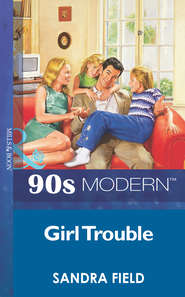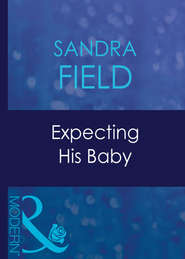По всем вопросам обращайтесь на: info@litportal.ru
(©) 2003-2025.
✖
Honeymoon For Three
Автор
Год написания книги
2018
Настройки чтения
Размер шрифта
Высота строк
Поля
They dealt with the bill and the tip, then Cory led the way into the foyer. When she had her coat on, Slade said, “I’ll walk you to your vehicle before I call a cab.”
Suddenly aware that she was exhausted, Cory also realized there was no point in arguing with him. She walked out into the dark street, pulling her coat closer. “Is it ever going to warm up? I’m only a couple of blocks away.”
Slade took her by the elbow. Music drifted from a jazz bar; traffic lights blinked red and green, and a crowd of teenagers jostled them on the sidewalk. Cory walked fast, her heels tapping on the concrete, her one desire to be alone in her little house. She’d made a fool of herself tonight. An utter fool.
When they reached the truck, she turned to face Slade. “I don’t expect we’ll see each other again,” she said. “Thanks so much for all your help with the land, Slade. And good luck with all your other projects.”
The wind was playing with her hair; she looked as remote as a statue. He had nothing to lose. Nothing. He cupped her face in his hand, kissed her parted lips and stepped back. “Goodbye, Cory,” he said, and to his considerable satisfaction saw that she no longer remotely resembled a statue. Rather, she looked as if she’d like to run him over with her truck. He added blandly, “I’ll wait here until you’ve driven off.”
With uncharacteristic clumsiness she unlocked the truck and climbed in. Then she slammed the door, and with a roar of the accelerator drove away down the street.
Slade headed up the hill, his hands in the pockets of his raincoat. He’d eaten too much; it would do him good to walk back to his hotel. Besides, he was too riled up to sleep.
Cory Haines wasn’t any more indifferent to him than he was to her.
Not that it mattered. Because he was going to put her right out of his mind.
Two days passed. Slade met with the mayor and the city council, pushed through his plans for the waterfront, inspected several sites on the Bedford Basin, and was approached about a lucrative contract in Montreal. But all his spare moments were spent thinking about Cory. Cory and her idea that he father a child.
Why didn’t she want to get married? Was she widowed or divorced? Why had she been so rigid in his arms on the dance floor, so resentful of his kiss by the truck? And why had she chosen him as the sole recipient of her idea?
It was an atrocious idea. So why the devil was he thinking about it night and day?
He knew why. For one thing, if he agreed to it, it would mean he’d be able to make love to her. Assuage the gnawing hunger for her body that had been with him ever since he’d first met her. Maybe then he’d be able to forget her, and she’d stop figuring in his dreams every time he laid his head on the pillow.
The other reason was one he had difficulty bringing himself to acknowledge even in the privacy of his own thoughts. If Cory got pregnant, then a child of his would be alive in the world. His own flesh and blood. Alive. Living and growing and learning.
Cory would be a good mother; he’d stake everything he owned on that. But he, Slade, would be an absentee father, his sole act that of procreation. He wouldn’t love the child. He wouldn’t even see it.
He’d be uninvolved. Safe.
His thoughts went round and round in his head, like hamsters on a treadmill. But, unlike the hamsters, he couldn’t get off the treadmill. Let alone out of the cage.
He spent the weekend with his mother, hanging pictures, carrying boxes up from the basement and painting the smaller of the two bedrooms; on Sunday they drove to Mahone Bay, where she bought herself a lovely antique armoire that he lugged into the newly decorated room and polished with lemon oil.
He planned to go back to Toronto before the end of the week. On Tuesday evening, irritable and out of sorts, he walked to the squash club. He’d booked a court for an hour, which should be long enough to wear himself out; Tom had promised to meet him there. At least when he was playing squash there wasn’t time to think about Cory. Nor was he worried about meeting her there; she and Joe always booked for early in the morning.
He played like a man demented, fighting for points he wouldn’t ordinarily have contested, risking shots that more often than not paid off, to his surprise and Tom’s chagrin. Because he was totally focused on the game, he didn’t notice the small crowd of onlookers in the gallery above his head, their heads swiveling to follow the shots. He certainly didn’t see Cory among them.
She was standing well back, clutching her racquet to her chest. For a big man Slade moved like greased lightning, his sneakers squeaking on the floor, his racquet digging the ball out of impossible situations; he was constantly on the attack, only rarely allowing himself to be caught defensively. A lot could be learned about someone by watching him play a game. He was, she thought fancifully, playing as though demons sat on his shoulder.
Ten minutes before she was due for her own game, she edged free of the spectators and ran downstairs to the women’s locker room.
Slade, had he been asked, might have agreed with Cory about the demons. But Tom, a chemistry professor, had had an extremely frustrating day at work, and at the end of fifty-five minutes Slade won by only a narrow margin. They shook hands, laughing, then Tom wandered over to the benches to talk to one of his students. Slade strode down the narrow corridor towards the locker rooms, swiping at his wet hair with his towel. He had to figure out a way to return those high-lobbed serves of Tom’s and keep control of the T at the same time.
He didn’t even see the woman until he had collided with her. His elbow brushed the softness of a breast, his arm automatically clutched her round the waist and her racquet dug into his ribs. Then she pushed back from his chest and he saw that it was Cory. She was wearing shorts and a white knit shirt, a sweatband holding back the thick sheaf of her hair. He said blankly, “You only come here in the mornings.”
“Joe’s out of town. So I’m playing with a woman friend.” Slade’s T-shirt was soaked with sweat, clinging to his chest so that she could see the curl of dark hair from throat to navel and the jut of his collarbones. He was still breathing hard.
Feeling breathless herself, her palms tingling from the contact with muscles as hard as a board, she heard him say, laughter warming his voice, “You don’t want to be within ten feet of me right now. I’m in need of large quantities of soap and water.”
This man to be the father of her child? Heaven help her. Cory said ironically, “I was watching you for a while. Remind me never to get in a squash court with you—you’d pulverize me. Do you always play like that?”
“Cory,” he said, “after your game why don’t you join me at Harold’s Pub for a snack and a beer? I’ve been thinking about your idea.”
She said vigorously, “That’s one discussion I do not want to reopen.”
“I might agree to it,” he said.
She paled. “Are you serious?”
“Given certain conditions. I think we should at least talk about it some more.”
With a hunted look she said, “I’m late; I’ve got to go. All right, I’ll meet you there in about an hour.”
Sweat was stinging his eyes. Slade wiped his face again and headed for the shower. He’d really only opened the way for negotiations, he told himself as he pushed open the locker-room door.
He hadn’t made any hard and fast decisions.
CHAPTER FOUR
SLADE had eaten a plateful of nachos with very hot salsa and downed two beers by the time Cory walked in the door of the pub. Several of the men eyed her speculatively, and in a primitive surge of possessiveness Slade stood up, waving to her. She smiled, wending her way through the tables; she looked slim and attractive in jeans and a brown leather bomber jacket. He rested his hands lightly on her shoulders and kissed her, unsurprised to feel tension knot her muscles.
“You’re quite a woman,” he murmured. “Fifty-five minutes of squash and I still want to throw you down on the floor and make love to you.”
Color crept up her cheeks. “The bouncer wouldn’t approve.”
“Plus the carpet needs cleaning.”
With great relief Cory saw the bartender approaching. They ordered burgers and draught beer, then Slade asked, “How did your game go?”
“I lost—couldn’t concentrate.” She hesitated. “I thought you’d have gone back to Toronto by now.”
“Friday afternoon.” As their beers were delivered, he paid for them, waited until the bartender was out of hearing, then added, “Although I could delay my flight until Sunday. That way we could spend the weekend together. During which I’d do my best to make you pregnant.”
“Slade, I—you’ve got the wrong idea.” As if she knew exactly what she was talking about, rather than having only the haziest of notions from reading popular magazines, Cory said in a rush, “There are clinics—it can all be done artificially.”
“What did you say?”
“You heard.”
His eyes narrowed. “I’ve applied several adjectives to you in our brief acquaintance, but cold-blooded wasn’t one of them. Artificially, for Pete’s sake!”
“The whole situation’s artificial! And I’m not cold-blooded. We hardly know each other, and we certainly aren’t in love with each other—how can we make love?”
“Very easily, I assure you. People do it all the time.”
“I’m not people. I’m me.”











